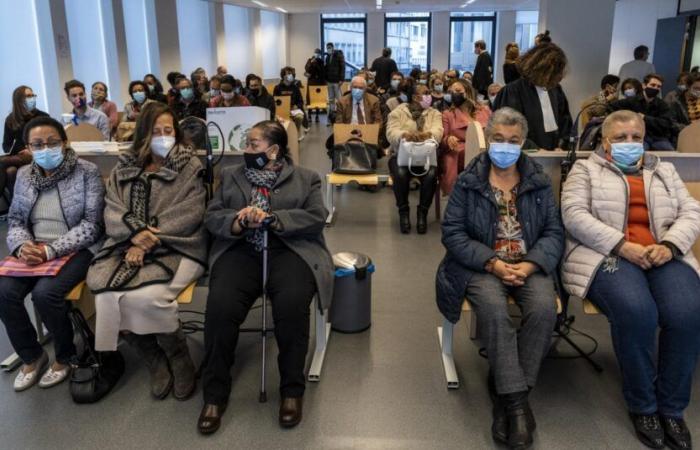The conviction of the Belgian State for crimes against humanity committed during colonization is historic. It also opens the way to other actions for reparation, throughout the world and for policies dating back very far in history.
The Belgian state is guilty of crimes against humanity. The judgment of the Brussels Court of Appeal, this December 2, vindicates the five women who took legal action in June 2020. As revealed then by Le Vif, Le Soir and RTBF, they blamed Belgium for the kidnapping systematics of mixed-race children in the Congo, from 1911 to 1960, during colonization therefore. According to the court, Léa Tavares Mujinga, Monique Bitu Bingi, Noëlle Verbeeken, Simone Ngalula and Marie-José Loshi, born to a black mother and a white father, “were taken from their respective mothers, without the consent of the latter, before the age of 7, by the Belgian State in execution of a systematic search and kidnapping plan for children born to a black mother and a white father, raised by their mother in the Belgian Congo, solely because of their origins. They were thus victims of “an inhumane act and persecution constituting a crime against humanity under the principles of international law”.
This is what they considered when they sued the Belgian State for crimes against humanity (non-prescriptible since 1968): they considered themselves to have been “deprived from one day to the next of their mother, of their loved ones, of their family; adequate food and the most basic care; uprooted from their own culture, from their origins; deprived of identity sometimes victims of mistreatment, violence, sexual abuse and rape. They accused Belgium of having “deprived them of any de facto possibility of claiming a legal link with their family (right to maintenance, possibility of inheritance)”. Which in their eyes amounted to “stolen lives, for the sole reason of being born mixed race” and which turned out to be “the result of the widespread and systematic policy of forced kidnappings decided and implemented by the Belgian State with the assistance of the Church.
The Court of Appeal heard them, condemning the Belgian State to compensate the five ladies to the tune of 50,000 euros for the moral damage caused by “the loss of their connection to their mother and the attack on their identity and their connection to their environment of origin. Léa Tavares Mujinga, Monique Bitu Bingi, Noëlle Verbeeken, Simone Ngalula and Marie-José Loshi each demanded this amount, as reparation, apologies “to the Métis from Belgian colonization and their families” (the number is estimated today ‘today between 15,000 and 20,000 minimum), made in Parliament, on April 4, 2019, by Charles Michel is not enough for them. The Belgian Prime Minister at the time recognized “the targeted segregation” of which the Métis “were victims under the colonial administration of the Belgian Congo and Ruanda-Urundi until 1962 and following decolonization, as well as the policy of “related forced kidnappings”.
Persecution of the works of a State constitutes a crime against humanity
For Céline Bardet, lawyer, international criminal investigator and founder of the NGO We are NOT Weapons of War, the decision of the Belgian justice is “extremely important because, in addition to its historical aspect, it concerns crimes committed during colonization, which was until now very rare. The societal impact can therefore also be very strong. Then, on a legal level, it is an earthquake, at least for three reasons. First, because the judgment provides proof that we can succeed in constructing a legal argument on the basis of the crime against humanity by applying it to practices which go beyond the framework of armed conflicts: the judges qualify the ”persecutions” of ”crimes against humanity”. To see there an intention of the Belgian State in its actions against a population for reasons of race or ethnicity.
Then, because Belgian justice, according to the expert – who notably worked at the International Criminal Tribunal for the former Yugoslavia and who has returned from a mission in Ukraine – “opens up possibilities for referrals on this basis for a host of situations, which can go back a long way in history. We can even imagine that descendants of American Indians now rely on this case law to take legal action.”
“We can imagine that descendants of American Indians will now rely on this case law to take legal action
Thirdly, because it is a State which is found guilty and as such condemned: “There was already an open breach with the responsibilities pointed out to companies for complicity in crimes against humanity,” recalls Céline Bardet. From now on, we go beyond private entities and the breach widens to the legal personality of a State, which is unheard of. His actions, at a specific moment, can be qualified as crimes against humanity. That said, be careful: the decision of the Belgian courts does not set in stone all those that would eventually be rendered elsewhere following similar referrals.”
Tomorrow: the Church too and fewer official apologies?
Could institutions, like the Church, cited in the summons of the five ladies, also be attacked in court, from now on, on the basis of the judgment rendered this December 2? “Absolutely,” continues the international investigator. There have been attempts to prosecute the Church in Serbia and Bosnia, for complicity in crimes against humanity, there are discussions today around prosecutions against it in the context of sexual violence committed in its name. breast by qualifying it as crimes against humanity… The Belgian court decision also opens the breach to prosecutions against the Church, which is an entity and has a legal personality.
In the meantime, we can assume that the condemnation of the Belgian state does not encourage other of its counterparts to ask for forgiveness or apologize for policies carried out in the past. Because their official recognition and this admission of guilt would inevitably trigger legal action, and therefore the risk of being convicted and having to make reparations, particularly financially. “Recognizing its actions, as a State, is really important for the victims,” recalls Céline Bardet. But that’s obviously not enough. And in the context of a legal process, it is an element that can be used by anyone who sues this State. It’s a sort of signal given to victims: there is a way to go further, to obtain more than an apology, to obtain reparation. This is perhaps, indeed, one of the reasons why States are so cautious about requests for apologies.”






